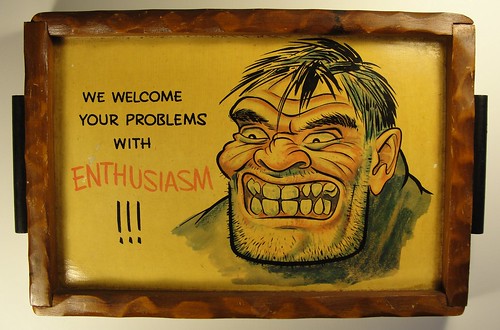 Fortunately I rarely experience terrible customer service. But this weekend, I had one of those incidents where someone whose job it is to provide service chose instead to throw out subtle insults and avoid trying to understand or address a problem for which they are responsible. So I thought it’d be a good topic to explore. It also made me think of one of my favorite TV shows: The IT Crowd. This is a British humor show that used to be available online. The show revolves around a corporate IT department consisting of two men and their supervisor. One of the funny parts of the show is when employees of the company call the department to get help with their computer. The two men always ask “have you tried turning it off and on?” This is so common of a response that they have even recorded it so the phone can be answered automatically and the response given without them getting involved. For these IT experts, turning your computer off and on is a very obvious first solution to try, but they never make fun of the person asking them for help – well at least not directly to them. The humor comes more from how regularly they have to say the same thing over and over to the point that they seem to say it without thinking. Then if their suggestion of turning it off and on doesn’t work, they go off to provide the service for which they get paid and usually on the way get into all kinds of mischief.
Fortunately I rarely experience terrible customer service. But this weekend, I had one of those incidents where someone whose job it is to provide service chose instead to throw out subtle insults and avoid trying to understand or address a problem for which they are responsible. So I thought it’d be a good topic to explore. It also made me think of one of my favorite TV shows: The IT Crowd. This is a British humor show that used to be available online. The show revolves around a corporate IT department consisting of two men and their supervisor. One of the funny parts of the show is when employees of the company call the department to get help with their computer. The two men always ask “have you tried turning it off and on?” This is so common of a response that they have even recorded it so the phone can be answered automatically and the response given without them getting involved. For these IT experts, turning your computer off and on is a very obvious first solution to try, but they never make fun of the person asking them for help – well at least not directly to them. The humor comes more from how regularly they have to say the same thing over and over to the point that they seem to say it without thinking. Then if their suggestion of turning it off and on doesn’t work, they go off to provide the service for which they get paid and usually on the way get into all kinds of mischief.
Don’t insult people because they don’t know what you know
In engineering, we also have people who call with problems that to us seem to have very obvious solutions. The key to providing great customer service is understanding that we only know what we know because we have been trained and have experience in that specific topic, and we are entrusted with helping others out who don’t know. We also should not expect or be upset because someone comes to us for help – it’s part of our job to help people. So if someone calls asking for information or help, we should not respond by insulting them for not knowing what we know or making them feel bad. Sometimes this can be difficult because we can offend without meaning to. It can be a fine line between helping someone understand and insulting them by assuming they know nothing. To avoid this, I usually try to figure out the baseline for their knowledge about what we are dicussing and work from there.
Dont’ insult people because they need your help
Customer service is also difficult because people are usually calling because they have a problem and many times are not happy. And even though they might have completely misunderstood, we need to remain focused on understanding their problem and helping them figure out a solution. Insulting them or being rude or mean is not conducive to fixing the problem. I saw an excellent example of this on the show Hoarders the other night. A woman who was a hoarder was having a complete meltdown and yelling at everyone including the case worker. But the case worker, instead of allowing herself to be drawn into the battle, remained calm and focused on her objective – helping this woman to part with all her stuff.
Failing at customer service is failing to perform your job
If our job includes customer service, and we fail to successfully provide it, then we are failing at performing part of our job duties. So while some may fail because they haven’t been trained in providing it, or they don’t understand the points above, some people have suggested to me that a certain type of person will fail on purpose to keep you from bugging them. Their theory is that if someone is obnoxious and insulting every time you talk to them, eventually you seek help elsewhere and leave them alone. This would obviously be a work avoidance tactic. And it surprises me that people would do this because I would think at some point, people doing this would no longer be needed – they have trained people to get by without them!
Insults are ok if the service is outstanding?
Not sure if everyone would agree on this one. But it makes me think of the time I once worked on a job with a contractor who was very arrogant, obnoxious, and insulting. Even so, his company performed well, he did everything I asked, and I had no problems on the entire project. One day we were walking on the job, and he was explaining how he was having difficulty getting a piece of equipment for the project. He said he didn’t think the person working for the supplier liked him very much. I told him it was probably because he was so rude and insulting. Fortunately I knew he was the type of guy that didn’t take offense to such brutal honesty. He instead seemed genuinely surprised and mentioned how well we got along so he wouldn’t have expected me to think that. So I told him he was rude and insulting to me too, but I didn’t care and ignored it because he did such an outstanding job. I wasn’t there on the job to be best buds – I was there to successfully complete a project, and we were accomplishing that goal.
I have also heard of restaurants that operate under this theme. If you go to their establishment, they are rude to you, but supposedly people keep going back because the place is so awesome and the food is so good. So although I would not advocate this approach to customer service, I suppose the lesson here would be if you are going to be insulting and rude, you better be pretty darn good. But unfortunately I suspect most who are insulting are exhibiting that behavior to mask non-performance.
So who is really responsible for improving customer service?
I’ll use a sports analogy here even though I’m not really a sports person. If a pitcher is choking who do the fans get upset with? Yes, they are probably annoyed with the pitcher – perhaps he pushed himself too hard or is having a bad day or skipped too many trainings. But in the end only one person can pull him out of there. If the team has any chance of winning, the coach must be the one to assess the situation and make the call to send in a relief pitcher. Then it’s the job of the coach to figure out what’s wrong and help his player get back up to acceptable performance levels.
So my experience this weekend not only made me more reflective of my own performance as I help citizens. It also renewed my determination to do a better job myself, and it made me more aware that I have a responsibility for those who I manage. I need to make sure they are consistently delivering great customer service, and if they at some point might struggle I need to be there to help them out and get them back on top of their game. And I would think my supervisor would do the same for me.




You believe that people are insulting to mask non perforamnce? Why would they be employed if they are both rude and unperforming?
I’m not sure if that’s why some people are rude, but others have suggested that to me. Unfortunately I’ve worked over the years with a few people who are rude and do not perform their job well or sometimes much at all. I too have wondered how they keep their job, but perhaps it is due to politics (who they know – one I worked with had his dad become alderman to protect him).
Or because no one wants to go through the trouble of firing them so they just leave them alone. This would particularly be true if the person was in a union position. I know of one person at another agency who did not perform and had a negative impact on their group. This person’s supervisor had to go through two years of tedious supervision and documentation of their lack of performance and attitude. Even then, the person ended up quitting before they terminated them.
Great post! I think we’ve all experienced terrible customer service and I’m glad you took your awful encounter to ensure you’d be better at your job. It is all of our responsibilities to help one another out; like you said we can’t know everything and will need someone to talk to when we need answers.
When I get into a situation where people are rude or insulting instead of helpful I try to remember that we are all human and who knows what is going on in that persons life. Try “reverse customer service” or simply try to find someone else to help answer your questions.